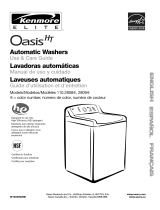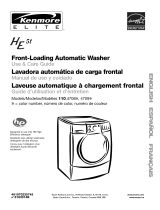
Whitest Whites
This cycle introduces liquid chlorine bleach to the load at the
proper time for improved whitening of your heavily soiled white
fabrics. Cycle combines high-speed wash action and high-speed
spin. The default option setting for this cycle is 2nd Rinse to
thoroughly remove detergent and bleach. For maximum soil and
stain removal, liquid chlorine bleach should be used.
Heavy Duty
Use this cycle for heavily soiled cotton or sturdy items. Cycle
combines high-speed wash action and high-speed spin. Stain
Treat is the default option for this cycle, but it may be turned off.
See "Changing Cycles, Modifiers and Options."
Normal
Use this cycle for normally soiled cottons and mixed fabric loads.
Cycle combines high-speed wash action and high-speed spin.
Casual/Wrinkle Free
Use this cycle to wash loads of no-iron fabrics such as sport
shirts, blouses, casual business clothes, permanent press and
blends. This cycle uses medium-speed wash action, a medium-
speed spin and a cool down process to reduce wrinkling.
Express Wash
Use this cycle to wash a few lightly soiled items that are needed
in a hurry. This short cycle combines high-speed wash action and
high-speed spin for the best cleaning and shortened dry times.
Bulky/Bedding
This cycle is designed for oversized items that do not easily
absorb water, such as comforters, pillows and poly-filled jackets.
This cycle gently washes these nonabsorbent items in a preset
water level to avoid damage. This cycle starts with a soak to
thoroughly saturate your large item. This is followed by medium
wash action and medium spin speeds to maintain load balance.
NOTE: Due to the preset water level, using this cycle for items
other than those described above will create an unbalanced load.
Sheets/Towels
Use this cycle for sheets, pillowcases and towels. The wash
action of this cycle is designed to help keep large items from
tangling and bailing up.
IMPORTANT: For best performance, drop items in loose heaps
evenly around the basket wall. Do not load items directly on the
impeller for this cycle.
Darks/Colore
Use this cycle for dark or highly dyed natural fabrics such as
jeans or other cotton items that may be susceptible to dye loss.
This cycle uses low to medium-speed wash action and high-
speed spin. For best results use cold or warm water.
Delicate/Handwash
Use this cycle to wash lightly soiled special care garments or for
items labeled as "Machine Washable Wool or Silk." (Check label
instructions to make sure that the garment is washable.) This
cycle uses intermittent-low speed wash action and low-speed
spin for the gentlest fabric care with less wrinkling.
Garments are labeled "Nandwash" because:
• The fiber construction may be sensitive to wash action.
• The fabric contains sensitive dyes that may bleed.
NOTE: Some "Handwash" items naturally shrink when washed.
Keep this in mind when you purchase items labeled "Handwash."
Items that shrink should be dried flat. When these items are still
wet, "block" them by gently stretching to the original
measurements.
Rinse/Drain & Spin
The Rinse & Spin and Drain & Spin cycles are selected with the
same button.
©
Rinse/Drain & Spin
Rinse & Spin
This option performs a rinse only followed by a high-speed spin.
The time display will include an estimate of how long it will take to
fill and drain the washer.
When to use Rinse & Spin:
• For loads that need rinsing only.
• For completing a cycle after the power has been off.
To
1.
use Rinse & Spin setting:
Press RINSE/DRAIN & SPIN button once. The Rinse & Spin
indicator light, along with the Spin Speed, Water Temperature
and 2nd Rinse lights will glow. You may change the Spin
Speed and Water Temperature modifiers only.
NOTE: A Rinse & Spin cycle time of approximately
20 minutes will appear in the Estimated Time Remaining
display.
2. Press START.
Drain & Spin
An extra drain and spin may help shorten drying times for some
heavy fabrics or special-care items. Drain & Spin may also be
used for draining the washer after canceling a cycle or
completing a cycle after a power failure.
To use Drain & Spin setting:
1. Press RINSE/DRAIN & SPIN button once. The Rinse & Spin
indicator light, along with the Spin Speed, Water Temperature
and 2nd Rinse lights will glow. You may change the Spin
Speed modifier only.
2. Press 2nd RINSE to deselect Rinse & Spin. The 2nd Rinse
and Water Temperature lights will shut off to indicate that a
Drain & Spin cycle has been selected.
NOTE: A Drain & Spin time of approximately 10 minutes will
appear in the Estimated Time Remaining display.
3. Press START.
IMPORTANT: Water will dispense in the washer for a
moment, the lid will unlock, lock again, and then the Drain &
Spin cycle will continue. This is normal.
Clean Washer
Use the Clean Washer cycle once a month to keep the inside of
your washer fresh and clean. This cycle uses a higher water level
in combination with liquid chlorine bleach to thoroughly clean the
inside of your washing machine. See "Cleaning Your Washer."
©
CleanWasher
USE8LEACH ONLY
IMPORTANT: Do not add detergent to this cleaning cycle. Use
only liquid chlorine bleach. Do not place garments or other items
in the washer during the Clean Washer cycle. Use this cycle with
an empty wash tub.
16





























